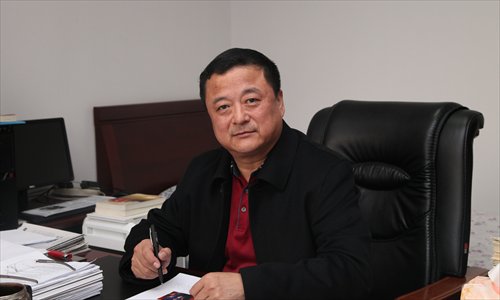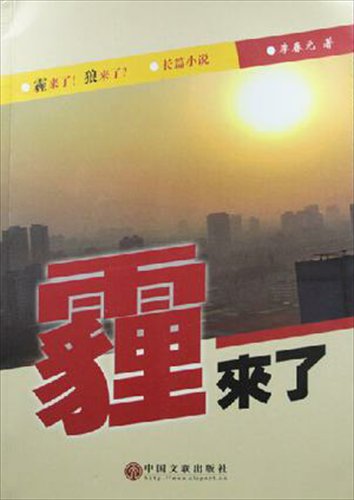Environmental official uses fiction to highlight pollution problems

Li Chunyuan in his office. Photos: Courtesy of Li Chunyuan

Cover of The Smog is Coming
It's a classic conflict. On one side, the corrupt county head who plans to use money allocated for environmental protection to construct an office building; on the other side is Lv Zhengtian, the righteous chief of the county's environment protection bureau (EPB). Lv stands up to the county head, who promptly sacks him.
This isn't real life, but part of The Smog is Coming, a novel by Li Chunyuan, deputy chief of the EPB of the city of Langfang in North China's Hebei Province, one of China's most polluted provinces.
Last year, Li spent three months finishing the novel, with inspiration drawn from his six years' experience as an EPB chief.
Consisting of four parts, the novel's main characters are all linked to pollution in one way or another, and range from county officials and EPB chiefs to the owners of polluting businesses and volunteers.
Chinese officials publishing their own books is nothing new. But Li's novel grabbed more attention than usual, as it illustrates the quandary facing the largely-toothless watchdogs in charge of protecting China's increasingly ravaged environment. The novel reveals some of the opaque inner workings of local EPBs and their relationship with GDP-pursuing local governments who shield polluting businesses.
In his novel, after Lv Zhengtian is sacked, and since no one wants to fill his post, the county head asks three subordinates to work as the acting bureau chief, for a month each. When the county head asks them to approve a chemical plant that doesn't meet environmental standards, the three of them either openly or secretly defy him, and eventually bring him down by reporting his misdeeds to the city government.
Li said that this would never happen in real life. "It's rare that the entire EPB will try to resist a county head's order in such a dramatic way. My novel shows my expectation of how things should be."
Awkward position
Aged 52, and a 28-year veteran of the PLA, Li has a stout build and a resonant voice, and doesn't fit the bookish stereotype of a novelist. But Li started writing when he was just 16 years old, and his work as an army reporter has been compiled into a thick book.
In 2008, Li started working as the deputy chief of Langfang's EPB. Several months after he took the post, he participated in a training program organized by the Ministry of Environmental Protection for China's city-level bureau chiefs. But what was meant to be a course on environmental governance turned into an opportunity for bureau chiefs to vent their frustration. "During the training, someone told me that in his city, officials would rather be demoted than work at the EPB, leaving the post of bureau chief unfilled for months. Another attendee said how environmental officials faced a glass ceiling in the government. I felt like I had entered the wrong industry," Li said.
Over the next few years, Li was put in charge of law enforcement, publicity, nature conservation and radiation safety, and his job required him to meet with factory owners, county heads and city officials. All of these experiences brought him to one conclusion: the role of an environmental protection bureau is an awkward one, trapped between their duties and the local government's pursuit of GDP growth regardless of the cost to the environment. "If you stick to your principles, you won't be able to stay in the post for a long time. If you want to have a long career, then you have to bend your principles," he told the Global Times.
Based on true stories
Li didn't know that all these factors would become a source of inspiration in the future. In 2012, when he was in charge of the bureau's publicity department, he wrote two short stories for the Langfang Daily. He then decided to compile them into an environmental reader for citizens.
A writer friend then suggested he add more materials and turn the short stories into a novel instead. Li became serious about the idea. He consulted people in the publishing industry, but they all told him to think twice. "Novels don't sell, they told me, and in Langfang's bookstore, even the classics can only sell 300 copies a year," he said.
But Li simply couldn't resist the idea. After finishing the draft, he paid a publishing house 50,000 yuan ($8,020) to edit, publish and print the book. That was roughly a year's income for him. "The new central government showed its resolution in fighting pollution. And there hasn't been any novel like this before. I believed it could be a hit," he said.
He was proved right. After the novel was published in June, Hebei's provincial environmental protection department ordered 1,000 copies of the book. Local governments and EPBs also bought the book in bulk. The 2,000 initial copies were soon sold out. Li printed more and gave them away free to Langfang's citizens. To date, he has sold or given away 16,000 copies, and the prestigious China Writers Publishing House will publish a new edition of the book this month. Reporters have flocked to interview him, and in February he was invited by famous television host Cui Yongyuan for a televised interview.
The only people who aren't happy are the county heads who feel pressured. "One county head called me and asked me 'why on earth did you write a book like this?'" he told Cui in the television interview.
But this won't stop Li. He is now planning a sequel.
The only thing that may prevent him from writing the sequel, it seems, are his new duties as the vice director of the bureau's smog prevention office. Just 40 kilometers from Beijing, Langfang is often one of the ten cities in China with the worst air quality, and cleaning up its air is a huge task. But Li has decided to crack this hard nut. Now, his schedule is packed with plans to supervise the city's new environmental projects and meeting experts to discuss smog-fighting strategies. "I now have little time to write," he said.
Newspaper headline: A novel approach